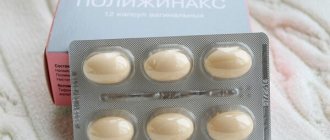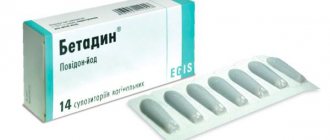Features and benefits of suppositories for pregnant women
In normal conditions, when a woman is not expecting a child, chronic thrush is most often treated with capsules and tablets. They penetrate the blood, affecting tissue and fungi from the inside. This method is quite effective, but the drugs are toxic and therefore their use is unacceptable during pregnancy.
To protect the unborn child and maintain his health, a woman is recommended to use suppositories for thrush during pregnancy.
This type of medicine is also commonly called vaginal suppositories. The advantage of such drugs is the peculiarities of their effects. The effect on the fungus is local, so the risk of side effects is reduced. And this is not the only advantage of drugs of this type:
- vaginal suppositories have a special sliding shape, which facilitates the process of insertion into the vagina. The soft base enhances comfort;
- the medicine is evenly distributed throughout the mucous membrane, as it dissolves easily;
- suppositories are practically not absorbed into the blood. This allows you to protect your baby from harmful influences.
The above properties make vaginal suppositories the only acceptable option. How should such drugs be used? Let's look at this below.
Time guidelines
The opinion of doctors is ambiguous. Some say that it is better not to use antifungal agents at all until the eighth (twelfth) week, since there is a risk of a negative effect on the fetus and the functional activity of the placenta. Others insist on treatment, arguing that the infection can transform into a chronic form, and its manifestations cause women a lot of inconvenience.
Suppositories for thrush in the first trimester of pregnancy:
- Betadine (up to the third month);
- You can also choose one of the universal options, the list of which is presented below.
Features of application
Vaginal suppositories are a special type of medication, so some women do not know how to insert them and may get confused. A few simple tips will help make the process easier:
- The candle is inserted once a day, at night. Before administering the drug, you must wash your hands thoroughly, but do not use any additional products (soap or gel);
- Vaginal suppositories, pads and applicators (if necessary) should be prepared in advance;
- Next, you should take a lying position and carefully insert the suppository deep into the vagina;
- After inserting the suppository, you must lie down for twenty minutes. This is necessary so that most of the fluid remains in the vagina. If possible, do this right before going to bed.
ADVICE. To make the input process easier, you can use an applicator. To do this, you need to lie down, raise your knees to your chest and move the candle deep into the vagina using the applicator. If the suppository is not inserted deeply enough, the medicine will either leak out or fall out.
You should also pay attention to the fact that some of the liquid will leak out. To avoid staining your underwear, place a pad over it.
Symptoms of the early stage of thrush and the causes of the disease
The causative agent of the disease is yeast-like microorganisms of the genus candida albicans, which prefer mucous membranes as their habitat. Fungi are considered opportunistic, and in small quantities their presence in the body (the mucous membranes of the stomach, intestines, genitals and oral cavity) is considered normal, but if the maximum value is exceeded, the area affected by microorganisms can become the vulva and cervix, which can lead to infection of the water bladder.
The reasons for the activation of candida and their excessive reproduction are internal factors:
- decreased immune system functions;
- changes in hormonal levels in the body of the expectant mother and its preparation for bearing a child;
- chronic diseases aggravated during pregnancy;
- taking medications, including antibiotics;
- diabetes and blood diseases (anemia, high sugar or cholesterol);
- poor diet;
- frequent viral and infectious diseases of the expectant mother;
- diseases of the digestive system;
- taking certain medications without a doctor’s prescription;
- colpitis and other “female” diseases.
Also, the prerequisites for the development of thrush are often considered to be excess body weight and wearing tight and uncomfortable underwear made of synthetic, non-breathable fabrics; in this case, gynecologists recommend abandoning thong panties.
Microorganisms are often transmitted through unprotected sexual contact from partner to partner.
The symptoms of the disease are more than typical:
- itching and slight inflammation of the genitals;
- the appearance of cheesy discharge of varying intensity and color, from white to yellow-greenish;
- characteristic sour smell on the gusset of linen.
The itching can be intermittent, but yeast activity usually peaks in the afternoon and evening, and after urination. As practice shows, the more advanced the process in terms of time and area of fungal infection, the thicker and more abundant the discharge is observed. However, this should not serve as a reason for self-diagnosis - in any case, consultation with a specialist is necessary.
In the absence of treatment, in addition to the discharge, there is significant redness of the mucous tissues, often reaching 85-90%, the symptoms subside, but a medical examination may reveal areas with a white or grayish-light coating, microcracks, areas of erosion and increased swelling.
The danger of thrush is aggravated by the fact that inflamed tissues are more vulnerable and susceptible to the proliferation of pathogenic and dangerous bacteria and microorganisms.
An accurate diagnosis is made by a doctor after a thorough examination of the patient and a smear taken for analysis.
Types of suppositories for thrush
Suppositories for thrush during pregnancy are recommended for pregnant women, as they directly affect the pathogen. The price range varies from budget options to quite expensive ones. However, you should not pay attention to this, but first of all to the recommendations of the gynecologist. What kind of candles can be used by women who are expecting a baby? Vaginal suppositories most often contain the following active substances:
- ketoconazole;
- clotrimazole;
- nystatin.
Clotrimazole is one of the most undesirable options on this list. If possible, you should replace it with Pimafucin, the most gentle antifungal medicine. Also, the best option would be suppositories such as Nystadine, Betadine and Livarol. Fluconazole is prescribed only for advanced forms of thrush. If possible, you should avoid this drug.
Pimafucin: description and benefits
Many gynecologists recommend using this particular drug, recognizing it as the most gentle and safe. Natamycin is the main active component of the drug, which has the following advantages:
- is not absorbed into the woman’s body through mucous membranes;
- bypasses blood from the gastrointestinal tract;
- does not pass through the uteroplacental barrier.
Even long-term use of Pimafucin cannot harm the unborn child, since the drug is absolutely safe.
It can be used both in early and late stages of pregnancy.
Important! The duration of treatment depends on the individual characteristics of the body. For some, three days are enough to cure thrush, while others should complete the course of treatment completely and take the drug for 9 days.
As a rule, such suppositories during pregnancy for thrush are taken once a day. Before purchasing the drug at the pharmacy, you must visit a doctor. This is necessary in order to avoid side effects: irritation and burning. This happens due to the fact that the medicine contains the following components:
- sodium hydrogen carbonate;
- cetyl alcohol;
- adipic acid;
- hard fat.
If you have already started using the product, then you should not worry too much, since side effects occur only at the beginning, and then go away on their own without stopping the drug.
Useful video about thrush during pregnancy
- List of sources: T.N. Bebneva, G.B. Dicke. Modern features of vulvovaginal candidiasis and the choice of rational therapy outside and during pregnancy // Russian Medical Journal. Mother and child. 2021, No. 1, p. 49-56
- Russian Society of Dermatovenereologists and Cosmetologists. Federal clinical recommendations for the management of patients with urogenital candidiasis // Moscow, 2013
- Russian Society of Obstetricians and Gynecologists. Clinical recommendations for the diagnosis and treatment of diseases accompanied by pathological discharge from the female genital tract // Moscow, 2019
- V.L. Tyutyunnik, N.V. Ordzhonikidze. Vaginal candidiasis and pregnancy // Russian Medical Journal. 2001, No. 19, p. 833
- A.L. Tikhomirov. Candidiasis vulvovagenitis. The problem persists. // Russian medical journal. 2012, no. 17, p. 858
- V.L. Tyutyunnik, N.E. Kan, N.A. Lomova, D.N. Kokoeva. Efficiency and compliance of therapy for vulvovaginal candidiasis during pregnancy // Russian Medical Journal. Mother and child. 2021, No. 2(I), p. 54-58
- Register of Medicines of Russia: https://www.rlsnet.ru/
- https://www.primafungin.rf/
- https://pimafucin.ru/
Author
Olga Vaseneva
Pharmacist
Share
Treatment of thrush at different stages of pregnancy
Suppositories for thrush during pregnancy can be taken both in the later stages and in the early stages. Let's look at all the drugs in more detail and what suppositories can be given to pregnant women for thrush at one stage or another.
Clotrimazole
Taken in the form of vaginal tablets. Allowed in all trimesters of pregnancy except the first, but not suitable for all women. That is why before purchasing the drug you should undergo an examination by a gynecologist.
Treatment is carried out within a week.
The drug is inserted deep into the vagina without the help of an applicator. If in the first few days a woman experiences burning and itching, the drug should be discontinued, as there is a high probability of an allergic reaction. Side effects may also include urinating more frequently than usual.
Terzhinan
Terzhinan is a vaginal suppository, the use of which is allowed from the second trimester of pregnancy.
However, if it is assumed that the benefit outweighs the risk to the unborn child, the drug is prescribed in the first trimester.
Bouchard-Recordati, the French laboratory that produces the drug, is reassuring women that the drug is safe. However, the US FDA says there is still a potential risk.
One of the components of the drug - prednisolone - makes local immunity weaker.
The course of treatment varies from 10 days to 2 weeks. Before inserting the suppository into the vagina, it must be lowered into the insertion for 30 seconds. The itching and burning disappear within a few days.
Betadine
This drug is approved in the first trimester. If a pregnant woman is not allergic to iodine and the functions of the thyroid gland are not impaired, then she can safely use suppositories during pregnancy for thrush. The course of treatment is one week.
In the second trimester, the use of the drug is highly not recommended, since the active substances penetrate the placental barrier. This, in turn, provokes malfunctions of the thyroid gland.
Livarol
The use of the drug is permissible in the second and third semester of pregnancy under the supervision of a gynecologist.
The active component is Ketoconazole, which acts on the vulva and vagina and bypasses the bloodstream. This makes it safe for the woman’s body and her unborn child.
The St. Petersburg Mycological Clinic conducted studies that found that recovery occurs in 96% of cases.
The results were obtained after examining 50 patients, each of whom completed a course consisting of 5 vaginal suppositories.
Drugs contraindicated for use
Among the drugs for thrush, there are also those that cannot be used in any trimester. One such medicine is Fluconazole. This drug is especially dangerous in the first trimester of pregnancy, as it can negatively affect the development of the fetus.
Foreign medical studies show that taking Fluconazole in the first weeks, when the organs of the unborn child are just developing, leads to tetralogy of Fallot. This is a congenital heart defect that has a complex shape. Use of the drug in the third trimester can lead to the following consequences:
- cleft palate;
- violations of the formation of the cranial vault;
- arthrogryposis;
- brachycephaly.
The only safe method of use is a single dose of 150 mg. However, this can be done in case of emergency.
Important! Flucostat is also a prohibited drug. The reason is simple - it contains the same component as Fluconazole.
How to treat at home
Traditional medicine recipes, like medications, can be used to a limited extent in the 1st trimester of pregnancy. For example, douching using soda and various herbal infusions is effective in suppressing yeast-like fungi - seemingly harmless procedures. But during this period of pregnancy, their implementation can not only have a beneficial effect, but also provoke negative complications in the form of:
- leaching from the vagina along with a fungal infection and beneficial bacteria that ensure the normal functioning of the woman’s reproductive organs;
- the development of allergic reactions to the components that make up a particular folk remedy;
- penetration of fungi through an incompletely formed mucus plug, which will lead to infection of the embryo.
Important! In the first trimester of pregnancy, only procedures for washing the external genitalia can be performed. In some cases, baths are acceptable. Any solution should be warm during use, and in no case hot or cold.
Most often, soda solutions, herbal decoctions or infusions are used for washing and preparing baths in the indicated trimester:
- calendula;
- oregano;
- chamomile;
- raspberry leaves;
- celandine;
- St. John's wort;
- sage
Rules for preparing soda solution
It is better to dissolve soda in boiling water so that the solution is as homogeneous as possible. But you can also use warm boiled water. For 1 liter of liquid, take 20 g of ordinary baking soda, which is mixed thoroughly. Then use the prepared product as intended. Prepare a new portion of the solution each time.
Rules for preparing herbal decoctions and infusions
- Decoctions for treatment
Select an herb or mixture consisting of several plants, place in boiling water at the rate of 1 part herbal mixture to 100 parts water. For example, for 10 g of herb you need to take 1000 ml of water (10 x 100 = 1000). Boil water with herbs for at least 15 minutes. Before use, the decoction should be strained using a strainer or gauze.
- Infusions
Place the selected plant/plants in a glass container, which is filled with boiling water. The ratio of herb to liquid is similar to that used to prepare decoctions. Leave the plants for at least 2 hours. At the end, strain the infusion and you can safely use it for its intended purpose.
Some have heard that in the 1st trimester it is better not to subject candidiasis to any therapy. Doctors have long refuted this statement.
Thrush can and should be treated at any stage of pregnancy. After all, the health and life of an unborn child is at risk! The main thing is to consult a competent specialist before starting a therapeutic course. This applies not only to taking medications, but also to using folk remedies.
During pregnancy, a number of changes occur in a woman's body that contribute to bearing a child. First of all, this period is characterized by hormonal changes and weakening of general immunity. This can lead to various diseases, including the proliferation of candida fungal infections in the genital tract. Suppositories for thrush during pregnancy will help solve the problem and avoid complications. In modern pharmacies they are presented in a wide range.
Treatment methods
An experienced doctor will definitely advise you to undergo treatment together with your partner. To achieve the best results, strict adherence to the doctor’s prescription is mandatory, and thoughts of self-medication or deliberately exceeding dosages are completely unacceptable.
At different stages, drugs with different effects are selected, the main task of which, in addition to normalizing the vaginal microflora, is to preserve the fetus and pregnancy.
It is important to remember that at any time, local treatment is a priority, since taking drugs orally can negatively affect the condition of the stomach and intestines, indirectly aggravating the situation.
Poor digestion reduces the quality of absorption of beneficial elements from food, impairs metabolism and affects the immune system, making the expectant mother even more vulnerable to bacteria. In addition, constipation or diarrhea adversely affects the tone of the uterus.
Consequences and threat to the fetus
Any disease of the female genital organs during pregnancy can cause various complications and pathologies of embryo development. Infection of the amniotic sac and amniotic fluid can have fatal consequences: if treated improperly or completely, bacteria can infect the skin and organs of the fetus, as well as cause dysfunction in the baby’s internal systems.
If a mother deliberately avoids treatment, the risk of premature termination of pregnancy or death of the child increases many times over.










